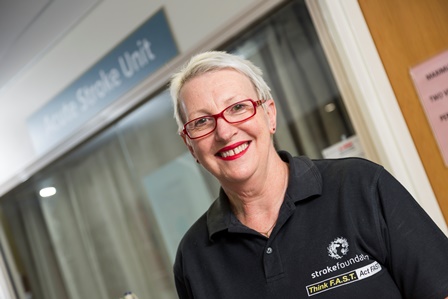Acute stroke unit admission favours positive outcomes
The Wesley Stroke Unit is setting the benchmark in acute care.

For Acute Stroke Unit clinical nurse manager Di Fichera and her nursing team at the Wesley, every day is a busy one.
Along with our Neurosurgeons and Neurologists, Di and her nursing staff work closely with an expert team managing patients who have suffered a stroke or transient ischaemic attack (TIA), with the aim of assisting the patient to regain their physical function.
"The Wesley Stroke Unit is recognised as a centre of excellence by the National Stroke Foundation (NSF) and is one of only a small number of Queensland hospitals approved to administer the clotbusting thrombolysis drugs to patients who have had an ischaemic stroke caused by a blood clot," Di said.
Di said research has shown the only thing that impacts on the outcome is being treated in an acute stroke unit and treated by an acute stroke team.
The National Stroke Foundation Acute Services Clinical Audit, which provides a snapshot of acute stroke care in Australia, has shown that patients who do not get access to a hospital with a stroke unit are far less likely to receive an appropriate level of care and treatment increasing their chances of death and severe disability.
"Our community need to recognise stroke is a medical emergency and therefore they need to seek medical treatment urgently, " she said.
The Wesley’s stroke unit is staffed by senior nursing staff and a multi disciplinary team, lead by neurologist Dr Noel Saines. It includes stroke liaison nurses, physiotherapists, an occupational therapist, speech pathologist and a dietician.
"The patient is reviewed by the whole team as soon as possible to determine treatment," Di explains. "Following assessment they are commenced on the acute stroke pathway (NSF) which guides monitoring, assessment and recovery."
Di said stroke patients who present to the Wesley Emergency Centre have available to them a standard of care that meets NSF recommendations and leading contemporary practice.
"Our patient’s receive gold class treatment for stroke," she said. "One of the benefits is we have our diagnostic imaging available on site. Patients have immediate access to brain diagnostics such as a CAT scan or MRI of the brain or ultrasound of carotid blood vessels. Once it has been determined there is not a bleed in the brain, treatment begins immediately. This can include a clotbusting drug (thrombolysis)."
When patients arrive in the acute stroke unit, they are placed under 24/7 supervision and monitoring.
"Cardiac monitoring is also standard procedure for Wesley stroke patients, as one of the most common risk factors or causes is atrial fibrillation, a type of arrhythmia. It is present in about one out of five strokes."
Di says as soon as possible Wesley stroke patients receive rehabilitation for any disabilities following their stroke. "Stroke is a brain injury due to lack of oxygen to motor centres. The most common disability is hemiplegia where one side of the body is paralysed, and this can also result in vision loss on one side of the body. The most tragic result is loss of speech," she said.
"To assist stroke patients with their rehabilitation we have a team of physiotherapists who specialise in stroke recovery. The Wesley Hospital has an inpatient and outpatient rehabilitation service on campus."
Di says GPs play an important role in early stroke treatment. "When GPs recognise stroke symptoms quickly, they can help the patient get help fast. It is vital they get them to an acute stroke unit in a tertiary hospital like the Wesley where they can be scanned quickly to ascertain the severity of the stroke and provided with the correct level of care to make a quick recovery."
"Regular checks for blood pressure, high cholesterol and blood sugars can assist early detection. Also minimising risk factors such as smoking, fatty foods etc. can minimise the risk of strokes."
Contact the Wesley Emergency Centre on 07 3232 7333.













